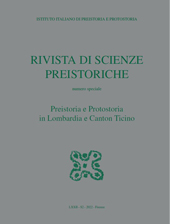Non solo incisioni : il patrimonio delle pitture rupestri della Valle Camonica (Brescia) : tecniche digitali di individuazione e restituzione, nuove scoperte e prospettive di tutela
P. 377-392
The presence of ancient paintings on vertical rock surfaces and under rock shelters is a comparatively new discovery amongst the well-known Valle Camonica rock art heritage, dominated by the rock-engravings. Very faded and almost invisible, some paintings have been briefly reported only in 1992, when the first ones were seen. In 2015 a specific project, proposed by the McDonald Institute for Archaeological Research (University of Cambridge) with the participation of the Archaeological Superintendence of Lombardy, was launched. This project proposes the use of new digital technologies, and in particular the use of the decorrelation stretch of the colour space (DStretch) in order to obtain a relatively clear image even from faded colour traces.
Here, first of all, we would like to introduce the application of this tool to the most important panel with paintings known so far in Valle Camonica, located in the municipality of Paspardo, on which it was possible to discover two new figures almost invisible to the naked eye not seen at the time of the first report (2008-2010). On the same site, we built a 3D model of the entire rock surface, that allowed us to gather a complete and detailed documentation: a full drawing of the painted area, made without touching the rock surface – in some parts heavily degraded – and even at the spots most difficult to reach.
These recent and stimulating discoveries have prompted to start a new season of field research, which led us to find new sites with paintings. Among the identified rock surfaces there is also an interesting case of overlap between painted figures and engraved figures. Along with an overview of our current knowledge of sites with paintings, we propose here some preliminary remarks on morphological and chronological aspects, as well as on the protection interventions to be programmed for this peculiar heritage. [Publisher's text]
Fait partie de
Rivista di scienze preistoriche : LXXII, supplemento, 2022-
Articles du même numéro (disponibles individuellement)
-
Informations
Code DOI : 10.32097/1182
ISSN: 2282-457X


